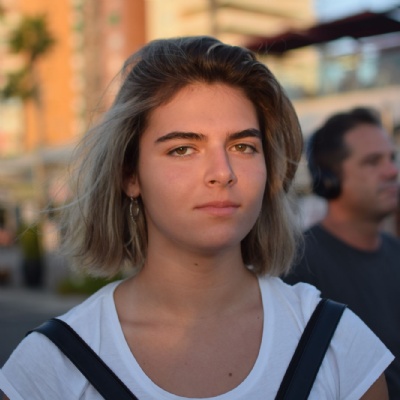
Jana Petreska
and belonging to a place
This year, our newly selected students chatted with Kristijan Fidanovski and Bobo Stankovikj. The conversations happened in familiar locations — the streets of their hometown or the shade of their local park. We hope these profiles help you get to know them 🙂
Filter

and belonging to a place

and belonging to a place
Jana rushed in to meet me — our spot was in front of the St. Clement statue in Ohrid’s square — about 15 minutes after she passed the first part of her driving test. She was late to it. She works as a waitress over the summer and had spent an hour after her evening shift trying to clean her work shirt, which was stained with orange juice. (She would’ve also been interested in being a cook — more on that later.) When her driving instructor noticed she’s not at the test site, he called Jana’s uncle, who called Jana’s mom (his sister), who called Jana — who was, obviously, fast asleep. So, her mom called the next-door neighbor, a friendly woman who banged on the door until Jana woke up. It takes a village, right?
Jana’s proverbial village is the city of Ohrid — a lake town rich with history and a UNESCO World Heritage Site — and she knows the place inside and out. In our 45-minute walk, she stopped to say hi to at least seven people, and she joked that’s because she’s been part of every sports team in a 10-mile radius. Sports weren’t enough: she’s a guitarist, a cook who makes the (self-proclaimed) best pancakes in Ohrid, a movie-maker who aptly titled her masterpiece “another female-directed movie not nominated for an Оscar”, and — in case you doubted her Ohrid cred — has taken fishing classes. She knows Ohrid so well that, at this point, she’s resorted to biking around the entire lake just to find a new angle to see the city from.
Of course, when you get to really understand a city as Jana has, you also notice some of its downsides. Some are more lighthearted — she joked that none of the Original Ohrid Pearls are actually original, but every resident gets paid a commission to play along with the prank. Others are more fundamental — Ohrid has a bad case of brain drain, and even Jana’s brother now lives and works in Skopje, only returning on occasional summer weekends to soak in the lake’s serenity. Those who stay end up having a tough time — both the local economy and the city’s natural heritage are at risk.
Jana hasn’t decided how exactly she’ll fix these problems yet, but a few ideas have crossed her mind. She’s considered medicine, but her education in UWC Waterford Kamhlaba only starts in January because the College is in the Southern Hemisphere, so she’ll be 20 by the time she graduates and much older by the time she becomes a doctor. She’s also considered engineering — perhaps something to do with architecture, similar to her older brother. But I was most captivated by Jana’s idea to enter the culinary world. She thinks new restaurants popping up in Ohrid often fail to present the city’s authenticity. Instead, she proposes talking to local grandmas — relying on her community and her interest in cooking — to make a truly Ohrid kind of restaurant with a local cookbook. Maybe she’ll even supplement it with some of the cuisine she experiences in eSwatini, too.
Since she has an entire semester until her UWC experience begins, Jana hasn’t had to pick subjects or meet her future peers. I think that’s fine; she’ll have plenty of time to dive head-first into the UWC bubble come winter. Until then, she has the opportunity to finally see Ohrid in a new light — knowing she’s about to leave, but determined to return.
Bobo Stankovikj, July 2021
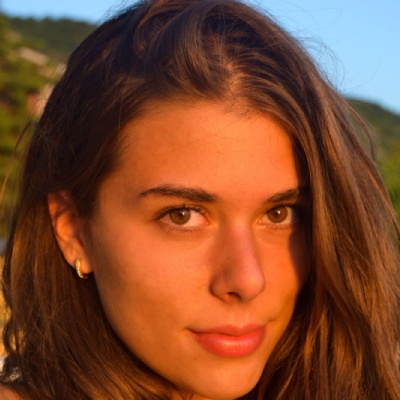
and not leaving anything to chance

and not leaving anything to chance
At 6:40 pm, twenty minutes before I planned to begin one of the info sessions in this year’s selection process, I received an email from Zoom. Bernarda Malevska has joined your meeting, it said. Not eager to leave things to chance, she was testing whether the link worked way before the session was supposed to start.
Weeks later, after she had already been selected, I ran into Bernarda at the National Debate Championship (I was an observer; she was participating). It came as a surprise to me: debate wasn’t something that had come up in her interviews. Yet there she was, competing in the semifinal round in her first year of debating. What’s more, she did this while Iron-Manning — the debate term for facing a three-person group when your team has only two members. (She lost in the semifinal, but I think it’s only because two of her three opponents are also going to UWC next year.)
How’d she do it? Well, she tends to come prepared. During our walk in the park — to which I arrived 6-7 minutes early only to find her already there — she outlined the arguments in favor of lifting patents on COVID-19 vaccines right before rebutting them herself. Bernarda had clearly done her research; in her words, she just likes knowing things. Maybe she got that drive from conversations with her dad, whom she loves hearing talk about history, or her mom, who welcomed Bernarda’s quarantine-interest to learn the piano. We agreed her dad would make a better debate coach, while her mom would be the better UWC teacher.
I suspect that the area Bernarda has the least control over is sports. She’s a huge fan; started following tennis with her dad, then trained volleyball for eight years (a fact she glossed over until I specifically asked about it). She is currently one of probably a handful of Macedonians who follow American football. An avid fan of Patrick Mahomes, she must have been bummed when the Chiefs lost the Super Bowl to the Buccaneers, doubly so since her best friend thinks Tom Brady is the better quarterback. If you had to Google any part of this paragraph, you can imagine how I felt during our walk!
In a stroke of luck, Bernarda found out she was going to UWC Robert Bosch College on her birthday. She almost didn’t answer our call — her hands were full of groceries for the small gathering she’d planned. She’s very excited for the alpacas and sheep, has already picked her subjects, and eagerly asked me for insight. The most useful piece of advice I had was to be careful around the electric fence, though I suspect she’s too mature to repeat my own mistakes.
On her first day at Orce Nikolov, Bernarda didn’t know anyone in her class. But she’s not one to wait around for good things to happen on their own. So, she went up to another girl, asked would you like to sit with me? and quickly made a friend. I have no doubt she’ll do the same in front of the Kartaus in August, too.
Bobo Stankovikj, June 2021
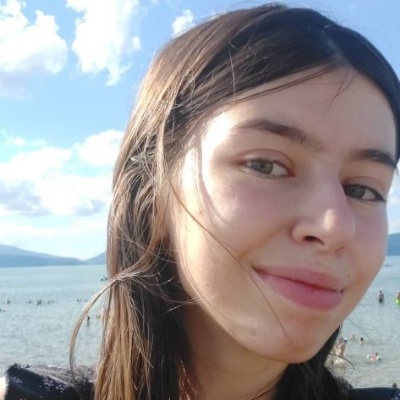
and relying on your environment

and relying on your environment
The type of honey a family of bees makes depends on their surroundings. If the beehive — typically a wooden box with 10 frames full of hexagons — is put, for example, by the river Vardar, the worker-bees will have access to all kinds of flowers that enjoy the open, humid environment. The result will be a light, meadow honey. If, however, one puts the beehive in between trees, in a denser setting, the bees will tend to produce a darker, forest honey. Wherever they are, the bees will use the opportunities around them — and if there isn’t enough flowers in one place, they can easily be “moved” so they can reach their potential.
Nela grew up in Kavadarci, at the edge of the city, in a part which (she jokes) only received street lighting last year. She’s been helping her beekeeping parents since she was a kid, and she could vividly — literally, with videos on her phone — explain to me the nuances of the trade. So far, she’s experienced almost every step of the laborious honey-making process, from making the frames and forming the hexagons (in which the bees store the honey), to placing the honey in a centrifuge which separates it from the wax (which the bees use as packaging), to relocating the beehives from one environment to another (so they get access to more pollen).
Like the worker-bees she cooperates with, Nela has an incredible ability to get the most out of the surroundings, and even to contribute to their improvement. I’ve yet to hear of an activity in Kavadarci she hasn’t tried. Karate. Dance. Piano. Archery. Drama. When the opportunities are provided to her, Nela makes use of them; when they aren’t, she’s ready to make them herself. She founded a branch of the Fridays for Future movement in her hometown, working to introduce her community to the effects of climate change. (Her family has already experienced some of them, because higher temperatures tend to mean less honey). Aside from the formal organization, she influences her social circle on a personal level: her friends now take their own bags when going shopping.
By the end of middle school, when it was clear that there wouldn’t be enough students in Kavadarci to form a foreign-language class in the city’s high school, Nela went to Veles and enrolled in the technical school, planning to become a nurse. Her decision means that Nela’s already experienced life in a dorm, and she’s already learned that it takes continuous efforts to succeed in an environment that lacks an authority figure to tell her to finish her homework. That’s why she believes she’s ready for chemistry and biology in UWC, even though she’s open to finding herself and trying out a number of unfamiliar subjects.
In August, when she arrives in Wales to begin her first year at UWC Atlantic, Nela might join their beekeeping club. Or she might not; that world’s already familiar to her. Regardless of what she decides, one thing is certain: this worker-bee is now moving to an environment with many, many more flowers. We’re eager to see the honey that comes out of it.
Bobo Stankovikj, June 2021
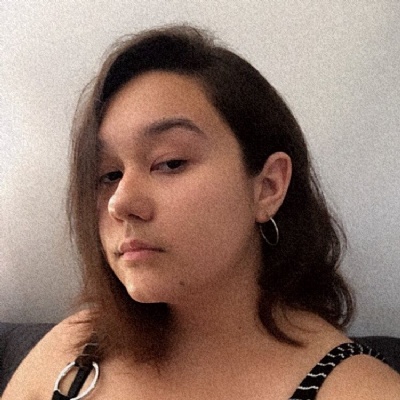
and the beauty of hard-won smiles

and the beauty of hard-won smiles
It’s something we say about all our UWCers, but boy is it true in this case: speaking to Ana Marija feels like speaking to an adult. Every time I make a self-deprecating joke about the dumb things I’ve done at UWC when I was her age, she waves it off. It’s fiiine, you were young, she says. I’m not sure she thinks she is, at least not in the patronizing sense of the word. I’m pretty sure she is right.
For most of our chat, Ana Marija has a poker face. I don’t know if she is always like that, but I like to think she is. It’s not that she never smiles, but her smile has to be earned (remember, she is not a kid!). For me, this also means she isn’t uncomfortable, which both kids and adults so often are. She doesn’t feel the need to hype up the conversation. She wants things to take their own course.
And yet, at one point, as Ivana is telling us a story, she waits for her to finish and simply concludes: You’re such a fascinating person, Ivana. Yes, Ana Marija’s kindness has to be earned. Which makes it all the more powerful when it finally comes to the fore.
At our selections, Ana Marija was the kind of applicant who was easy to grade, yet so hard to interview.
So, Ana Marija, if you could teach your favorite subject, what would you teach?
It’s not what I would teach but how.
Umm, OK, and is there a TV show you’ve seen recently that you didn’t like?
It’s not whether I liked it but why. We first need to establish if I had an objective issue with it, or if it was just a matter of taste.
I see…
You can see where this is going. But, mind you, it’s not like Ana Marija was dodging our questions. No, she was challenging them, and that’s something we only get from our very best applicants. Take that “favorite subject” answer, which actually went more like this:
It’s not what I would teach but how. Whatever the subject, I’ll have my students speak first and voice their misconceptions so we can deconstruct them together. There’s no point in teaching without having established a sound basis.
As I was listening to her second-round interview, I realized that this is someone who manages to say more when speaking than most people do when writing. Every word is measured, every sentence is quotable. This is what Ana Marija has to say about… well, life: You don’t *have to* do anything, that’s the point. It’s what you want to do, what you choose to do, what you’re passionate about that I truly believe we should be focusing on.
Ana Marija is going to UWC Li Po Chun, Hong Kong. It’s the first UWC she ever read about, so it almost feels like destiny (although Ana Marija would never make such a cheesy remark, this is all me). She listens to K-pop and even speaks some basic Korean, which – you guessed it – she taught to herself.
For the last two years, she’s been spending her days between Macedonia and Croatia, where her parents moved for work. When in Skopje, she lives with her grandparents (I can only imagine what that looks like, especially since she uses at least one English word in every sentence). As far as independence goes, this is someone we have no doubt whatsoever about sending halfway around the world. She says she already knows (well, we all said we did, but then…) what she wants to study at university (International Business Diplomacy) and the subjects she needs to take at the IB to do so.
Sometimes, Ana Marija sounds like the kind of person you just don’t want to rub the wrong way. Whenever she speaks about social issues, she sounds upset. But then you look at her more closely and you see her eyes lighting up. And you realize that this is someone who can spend their entire life righting wrongs and still be happy. Someone who can be happy because of choosing the hard way through life, not in spite of it. What better place to start than UWC?
Kristijan Fidanovski, July 2021
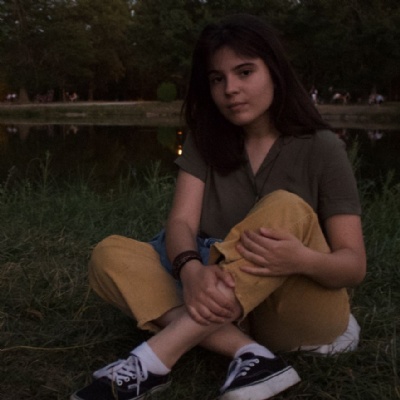
turning restlessness into selflessness

turning restlessness into selflessness
Ivana is one of those people who look like they are always in motion, even when they are static. In a video she submitted to us as part of the selections, she strolls through Skopje’s city park, snoops around the old bazaar, and poses next to a statue. As I got to know her (a little) better, I found the theme of her video incredibly appropriate: Ivana is someone who never stops exploring.
Is there something you wish you’d done differently during the second round?, we asked Ivana at her final-round interview.
Well, I sometimes felt like my mind was racing my thoughts, so I’m trying to improve this now, she responded.
Noooo, I wanted to scream at the screen. Why would she want to get rid of a trait others can only dream of having? It is exactly her restlessness, among other things, that makes Ivana special, even if she is not aware of it. After all, how else could she come up with a metaphor as beautiful as “the mind racing one’s thoughts” off the top of her head?
Often, Ivana looks like she operates on a different time scale – one where there are more than 24 hours in a day. Sometime in May, I wasn’t sure if it was a good idea to meet up before her end-of-year exams. But she was quick to laugh off my concern: it turned out she was already volunteering at a film festival that week, so an extra few hours wouldn’t make much of a difference. It also turned out she had taken the time to read up on UWC Mostar’s famous alumni, go through the bios of the members of our National Committee, and attend our parents’ meeting, which was intended for… well, parents.
As you can tell by now, Ivana lives and breathes UWC before even setting foot on the Mostar campus. While some of our students haven’t even spoken to their second years yet, Ivana is already making plans about buying a fridge with Vesna (I think this was a joke, but with Ivana, you can never be sure). The first thing she told us in her final-round interview was that she was reading a novel in Serbian, so I guess we’re sending her to the right college. Once there, Ivana is thinking of focusing on English language and literature, visual arts, and global politics.
Ok, so, remember that video I mentioned at the start? The prompt for it was “this is me”, yet Ivana’s video was about – Skopje. Kind of a weird choice for an application to study abroad, I thought. But three minutes later, I realized I’d just watched the best of over 50 such videos I’d had the chance to see over the years. I did wonder, however, if Ivana was worried we might interpret her video as a potential red flag for homelessness.
Of course, she shouldn’t have been, because the video isn’t really about Skopje, or any specific place. It’s about that recurring theme of Ivana being in constant motion. Remarkably for a “this is me” video, the camera rarely closes up on Ivana. Coming from someone with such a strong artistic affinity as Ivana, I’m sure this was an intentional choice. As she walks in and out of a dozen of beautiful shots scattered around Skopje, she leaves her mark on each of them. The message is that Ivana is no more – or indeed, no less – than the sum of the places she visits and the things she does for other people.
Indeed, her selflessness seems to know no limits. For example, when asked at the end of her interview if she had any questions for us, the only thing she wanted to know was if she can join the National Committee after graduation. Awww, Ivana, you’re too much!
By the way, Ivana’s “this is me” video is accompanied by Nina Spirova’s song, “Tell me about Skopje”. Тhere is a line in the song that reads: “You’re the happiest at home”. We just can’t wait for Ivana to turn this motto on its head and make the world her home. First stop: UWC.
Kristijan Fidanovski, June 2021
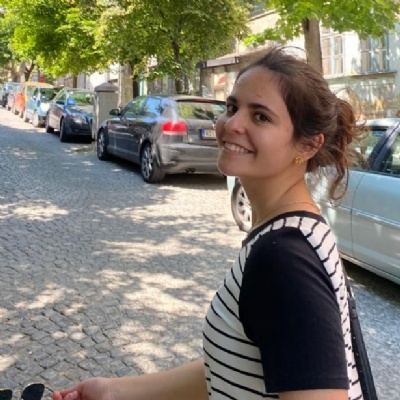
and the quest for originality

and the quest for originality
Most of our UWC kiddos are basically adults trapped in the body of teenagers. Ivana is no exception, but something else has caught my eye more. When Ivana talks to me, she doesn’t seem to perceive me as an adult. As we walk through the city park on a June afternoon, I feel like I’m talking to a peer. But more importantly, I feel like I’m being talked to as a peer.
This means (among other things) that I’m getting interrupted every 10 seconds, but in a good way. For Ivana, a conversation is just that: a two-way street. How are you feeling, Ivana? – Great, how are *you* feeling? (…) Are you excited about moving to India? – Yeah sure, are *you* excited about going back to the UK? And what was your PhD about again? And so, half an hour through our walk, I find myself blabbering about the demographic transition in Eastern Europe, and not an inch closer to finding out who Ivana Stojanova really is.
Except this is who she is. And it’s not just good manners: that unflinching spark of curiosity in her eyes about anything and everything is impossible to fake. Which also explains why she is such a person of action. The reason why she replied so briefly to my visa question was because she never let there be much of a story: her parents trusted her to take care of the application process by herself, and she did. A month earlier, when her parents were faced with the awkward dilemma of whether to send their 17-year-old daughter to another continent, they once again trusted her to decide for herself. Oh, if all parents could be like that. But they would need to have Ivana for a daughter.
And yet, even though she makes everything she does look so easy and ordinary, ordinary is exactly what she despises and seeks to avoid in life. A couple of times during our chat, she starts her sentence by saying: “I know this is a cliché, but…”. When asked during our selections what she liked best in some of the other applicants, she talked about how different they were from most people in Macedonia, who “whine all the time”. Yet, she also had a point of criticism for the other applicants: apparently they were “too dramatic at the end of the online mini-camp, and I didn’t get that… I mean, we’ll surely see each other again!”.
When put like this, Ivana’s avoidance of the dramatic and her commitment to originality and self-reliance verge on the pretentious. But I for one buy it 100%. At one point during our selections, we asked the applicants if they had any opinions that are unpopular even among their (presumably liberal) friends. Most applicants didn’t get the second part of the question and talked about their pro-LGBT or pro-green attitudes (which like, yeah, it’s 2021). Instead, Ivana spoke about the genocide in Myanmar, and how she first sympathized with their chancellor’s inability to take action before learning more about the chancellor’s role and changing her mind. If we ever needed proof of her originality, her decision to go with an answer that puts her in a bad light just to make sure it’s something we won’t hear from anyone else surely does the job.
But Ivana is an insanely original thinker also on more casual topics. As she was reflecting on how she felt when she wasn’t sure if she was going to UWC, while one of her friends among the applicants had already accepted her nomination, I thought to myself: aha, here comes the first cliché! Now she’s gonna start yapping about how good of a person she is for wishing her friend the best even when her own future was uncertain. But, as usual, Ivana proved the wiser. Why would I be jealous if my friend went and I didn’t, she wondered out loud. I mean, having a friend who goes to UWC can only be good news for me, as it means I choose my friends wisely, right?
On UWC Mahindra, Ivana says it’s the “most UWC college out there”. Whaaat, screams the Adriatic alumnus in me. “Well, it’s the most UWC college for me. It’s one of the most faraway colleges from here, so it will push me the hardest, and that’s what UWC is all about, right?”. It looks like Ivana has already figured out this UWC thing. Now it’s time for her to live it.
Kristijan Fidanovski, july 2021
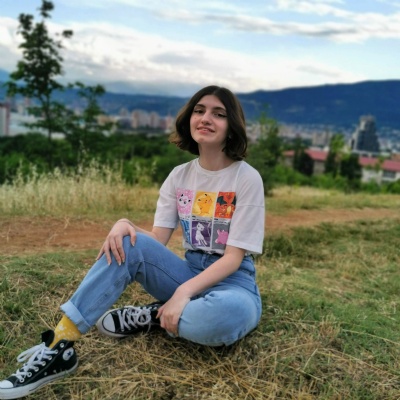
and being loud in a quiet voice

and being loud in a quiet voice
In one of her application essays, Maja quotes John F. Kennedy as saying that “the 18-year-old of today is as mature as the 25-year-old in their grandfather’s generation”. I don’t know if Kennedy said that, or if he was right. What I do know is that Maja is easily more mature than the average 25-year-old in her own generation. Was she trying to tell us something here?
Nah, I don’t think Maja would brag about herself like this. After all, she is someone who clearly prefers showing over telling: Maja’s maturity is written all over her activities. At 17, she is already doing paid work (!) as a logo designer – or, as she likes to think of herself, an “aspiring freelancer”. And you should hear the way she talks about the societal importance of gaming. Where most of her peers see a video game, Maja sees a potential tool for improving mental health and an integral part of the education system of the future.
Whenever her unbelievable versatility enters the conversation, Maja seems uncomfortable, almost embarrassed. In her application video, she told us semi-apologetically that her interests were “far from cohesive”. Raised in a society which likes to put people into boxes, Maja’s equal talent in the arts and sciences sticks out; in fact, it probably sets her apart even from our own students and alumni, and certainly from the author of this piece.
While we admire Maja’s scientific affinity, our hearts were won by her emotional and artistic side. In almost every conversation, Maja comes across as a human sponge capable of fully absorbing everything she experiences, and then giving it her own special touch. Where most teenagers see their siblings as a nuisance at worst and potential “partners in crime” at best, Maja pours her heart into her relationship with her younger brother. Her everyday interaction with him has inspired her to publish several illustrated stories for children, whose titles are listed on her LinkedIn profile. (Yep… she is on LinkedIn.)
With her short stature and quiet voice, Maja is probably not the first person you notice in a larger group. But she is often the one you end up remembering the longest. Her calm vibe and patience in listening to those around her can be mistaken for shyness. But when she does speak, Maja’s endless energy shines through every word that comes out of her mouth and passes on to you in no time.
In another application essay she wrote for us, Maja time-travelled to the medieval age. Having found herself there in her 21st-century clothes, she faced the need to keep a low profile to avoid being declared a witch. You couldn’t do it even if you tried, Maja, I thought as I was reading it. Starting with UWC Adriatic, she says she is hoping to achieve a “better world and a better me”. We wish her luck with the former. As for the latter, we wouldn’t change a thing.
Kristijan Fidanovski, June 2021
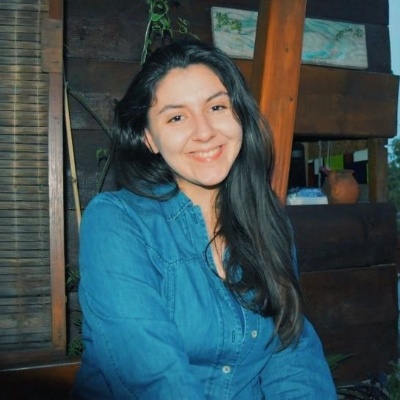
and unusual character contradictions

and unusual character contradictions
If someone asked me to describe myself when — in the distant 2013, at the age of 15 — I learned I was going to UWC, I would have offered a lot of answers. Too many answers. Enough to talk about myself for hours. In contrast, here’s Georgina’s answer to a similar question: “I don’t particularly like to describe myself. I don’t think you can define yourself that much… I think people are often wrong when they describe themselves because whatever you say won’t be entirely true.” You can imagine that writing a profile for someone who enjoys ambiguity isn’t the easiest task.
I suspect Georgina avoids categorizing herself because, in truth, there are several Georginas that come out depending on the circumstances. I noticed the first version of hers in November, when I read the creative essay in her application. In it, Georgina describes a TV show where scientists have to find a significant other, so they use pick up lines like if I’m an alkali metal, you must be a halogen, because I’d love for us to form an (ionic) bond! This is Georgina when she’s relaxed, when she’d describe herself as goofy. This is the version that was present for most of our walk (the one which gave a hearty chuckle after she slipped while eagerly walking to grab a coffee).
But, sometimes, you might encounter the melancholic Georgina. This is the version of the highschooler which reflects, deeply, on her experiences; the one which, even at an early age, rejected invitations to play outside because she’d rather color on her own. It’s not surprising that, in this form, Georgina starts writing poetry, and even manages to publish a collection of poems by the end of her first year in high school. She’s described poetry as “a spiritual protest, and the only genuine magic that humanity possesses,” so she writes lyrics along the lines of:
“I often speak
with water inquisitively,
asking her to shelter me
in her salty chambers,
and she often responds
lifting me in the air…”
The two Georgina’s might seem like they contradict each other. The goofy version jumps into new challenges — in fifth grade, she proudly sang a self-composed song in front of the music teacher, only to be politely asked to, perhaps, take her talents anywhere other than the school choir. The melancholic version collects memories, from the flow sheet in her first debate round to tickets to museums and postcards. Most of the keepsakes are in a notebook, but some — an old clock that used to belong to the poet Ante Popovski — have a special spot on her shelf.
I think Georgina can avoid a cognitive dissonance because she refuses to accept a single categorization; she refuses to describe herself as a single thing. She’s noticed that it’s possible — heck, even useful — to accept sometimes-contradictory ideas. Maybe it’s exactly this ability that explains her many debate successes, including winning the National Debate Championship last year, and being the second-place speaker this year.
Precisely because she can be many things at once, I think Georgina will have a formative experience at the UWC in Canada. I’m confident she’ll leave Pearson with plenty of material for her future poetry, and, in the meantime, she’ll fill her notebook with postcards from all around the world.
Bobo Stankovikj, June 2021
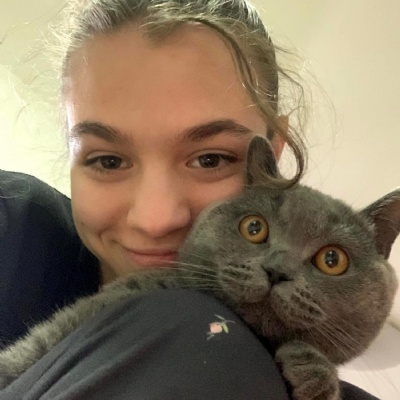
and the drive to improve

and the drive to improve
If you scroll through the United Nations jobs website, you’ll notice the organization looks for a few recurring skills: on top of substantive expertise, it helps to know a language or four, it’s nice if you’ve had experience in multicultural environments, and bonus points if you’re a self-starter. If, in the near future, the UN decides to start hiring fifteen-year-old high school students, consider this an honest recommendation for Sofija Gribovski.
You see, Sofija’s childhood has had a bit of a United Nations flair. She was born and raised in Skopje’s center. When in third grade her mom told her the family is moving, Sofija asked where, to Aerodrom? The actual answer was a little further — soon afterwards, the family relocated to Almaty, Kazakhstan. There, Sofija was placed in a Russian-speaking school and had to figure out, using her native Macedonian and the English she picked up through cartoons, how to communicate with her peers. A year in, by the time she learned Russian, they moved again. This time it was to Beijing, where she’s been for the past six years. (Our National Committee really tries to promote UWC to kids from outside Skopje; with the 7500 km to China, we joke that our efforts have clearly been very successful).
Given the multicultural upbringing — at this point, I’ve spoken to her in Macedonian, English, and in my elementary Chinese, but I hear she also speaks French — it’s probably no surprise Sofi is drawn to the United Nations. In her first Model United Nations conference — a simulation of how debates are run in the real UN — Sofija thought to herself, wow, these kids bite. She recalls an older delegate who likely noticed she was a beginner (she was in 7th grade at the time) and would often speak up to criticize her ideas. Sofi remembers this experience not because she holds a grudge (in fact, she’s still in touch with the delegate!), but because it showed her what she needed to do to be better.
And that’s what brings us to a central, motivating factor in Sofija’s life. She’s plenty aware that her experience is very unusual, and she’s determined not to let it go to waste. I see that I’m in a privileged position — how many people have never gotten this type of chance? So, I shouldn’t throw this away. In the middle of exam season, she was the goalkeeper on her school’s football team (which, by the way, isn’t even her main sport; she prefers volleyball). When defending a free kick, she broke her right hand and then took the exams anyways. (No worries — the team won 7-1).
With that unrelenting drive, Sofija will be going to UWC Changshu. Because of the pandemic, her experience will be rather unusual: most international students can’t get to campus, so the student body will be smaller in her first year. But, as always, she plans to make the best out of it, and is confident that her second year will be just as multicultural as UWC is supposed to be. In the meantime, she’ll work on getting better. She plans to focus on literature and philosophy in the IB, with an intention of studying law later on.
There’s a ton of problems that the world — and the United Nations — will need to tackle in the coming decades. Success will require a lot of talented, thoughtful, worldly folks working together. I wouldn’t be surprised if, in a few years, Sofija is one of them.
Bobo Stankovikj, June 2021
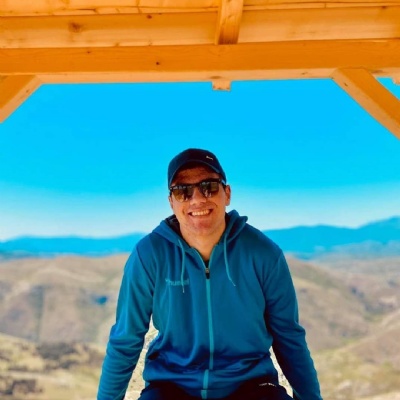
and analysis on multiple fronts

and analysis on multiple fronts
In the year 2000, Mike Anderson was arrested and charged with armed robbery of a fast-food restaurant. He was conditionally released on bail while waiting for the judge’s decision. A few months in, Anderson was convicted and sentenced to 13 years in prison, but a clerical error led the authorities to believe he was already there. So, there was no attempt on behalf of the police to rearrest him, and Anderson spent the following 13 years living his life as a rehabilitated man: he got married, founded a business, voted, and never so much as got a speeding ticket. By the end of his sentence, when Anderson was to be “released”, the State realized he was not actually in prison, which brought about the question of: what should happen now?
Marko — a seventeen year old from Veles, a debater, and a fan of law — could have deconstructed this ethical dilemma for hours. From the perspective of rehabilitation, the system’s stated goal was clearly achieved; Anderson was reformed. From the perspective of costs, it would be reckless to remove a productive member of society and have the state pay for it. From the perspective of retribution, he’s skeptical that the victim would want Anderson to face a sentence more than a decade after the robbery. Conversations with Marko always happen on multiple levels, using several paradigms, always paying attention to competing sides in the discussion. Only after we’ve considered the situation from each perspective can we come to the conclusion that the purpose of the legal system has already been met in this case. Even in a regular coffee chat, Marko builds cohesive arguments.
I am yet to find a topic which Marko was unprepared to offer me a thoughtful answer for, even though, believe me, I really tried. Even things you wouldn’t expect him to know — things there’s no reason for him to know — casually pop up in conversation. Did you know, for example, that his last name, Ingjilizov, probably comes from the village Ingilizovo, near Thessaloniki, which was named after its founder, who was likely English? Neither did I, but Marko had conducted a (at this point typical) historical research project: he started by interviewing other Ingjilizovi, then moved on to documents from the Macedonian Academy of Arts and Sciences, after which he relied on some googling. All of this just because he was curious.
Walking to the park in Veles — which, by the way, he’s well-acquainted with, since it’s the place where he trained handball, ran, and also broke a rib or two — I began to understand that this place isn’t big enough for Marko. It’s not that he’s not connected to Veles; on the contrary, he told me about the sense of belonging to and support from his community. But even a quick glance at his successes tells me Marko is growing too fast for his current surroundings. He recently won a simulation of a parliamentary discussion, after which he was congratulated by the President of the Macedonian Parliament. A month or two before, he came second in Euroquizion and, as a result, got to meet the EU ambassador. Around the same time, he made it to the final of the National Debate Championship (after which he didn’t meet anybody important, except that I drove down to Veles for a chat).
In about a month, Marko will be the first Macedonian representative in UWC East Africa in Tanzania. I have no doubt that he’ll make an impression largely because he’s already done it wherever he went. Georgina, who debated with him, told me how easy it was to work with him. Ivana, who faced him in a competition, mentioned that even the judges were left speechless by his speech. And to be honest, driving back to Skopje, I thought about how nice it would be — for Veles, for the legal system, and for folks like Mike Anderson — if Marko realizes his goal of giving back to his community.
Bobo Stankovikj, June 2021